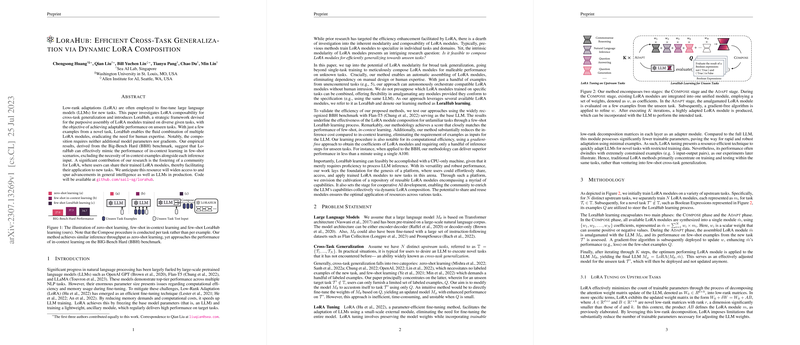Efficient Cross-Task Generalization via Dynamic LoRA Composition: An Analysis of LoraHub
The paper proposes LoraHub, a framework leveraging Low-Rank Adaptations (LoRA) to enhance cross-task generalization with LLMs. This work investigates the potential of LoRA's inherent modularity to enable adaptable performance on previously unseen tasks.
Overview of LoraHub
LoraHub facilitates the composition of LoRA modules, trained on discrete tasks, into a cohesive framework capable of generalizing across tasks. It employs a simple, yet effective approach to amalgamate these modules dynamically, without necessitating additional model parameters or human expertise.
The central innovation lies in LoraHub’s ability to achieve this through automatic LoRA module assembly with only a few examples from a new task, contrasting with traditional fine-tuning approaches that require extensive computational resources.
Key Methodological Insights
- LoRA Composition: Unlike traditional task-specific adaptations, LoraHub dynamically composes multiple LoRA modules, allowing flexibility in adapting to new tasks using minimal data.
- Module Combination: The approach involves an element-wise composition of LoRA modules, leading to an integrated module capable of performing various tasks. The composition is refined using a gradient-free optimization technique, which fine-tunes the combination coefficients.
- Empirical Evaluation: The paper employs the BBH benchmark with FLAN-T5 as the underlying LLM, demonstrating that LoraHub achieves competitive results with few-shot in-context learning, significantly reducing the token count per example during inference stages.
Results and Implications
LoraHub's empirical validation highlights its capacity for efficient few-shot learning with demonstrably reduced computational overhead. The framework showcases competitive performance in comparison to established gradient-based methods like full and partial fine-tuning. However, its performance on certain divergent tasks indicates room for further optimization in module selection and composition.
The implications of LoraHub are twofold:
- Practical Implications: The framework offers a low-cost alternative for users seeking to generalize LLMs across diverse tasks without excessive computational expenses.
- Theoretical Implications: It opens new avenues for exploring modularity and composability in model training, fostering interest in the orchestration of task-specialized modules for broad task generalization.
Future Directions
The research paves the way for developing more sophisticated pre-filtering techniques for module selection, which might enhance the efficacy and stability of LoraHub. Additionally, extending the framework to other model architectures, such as decoder-only models, remains an intriguing prospect.
The envisioned establishment of a collaborative platform for sharing LoRA modules also presents an exciting opportunity for community-driven enhancement of LLM capabilities. This aligns with broader trends in democratizing AI, enabling users with limited resources to harness the power of adaptive LLMs effectively.
In conclusion, LoraHub represents a significant advancement in the landscape of adaptive AI. While it does not outperform certain resource-intensive methods, it distinctively offers a balanced performance-efficiency trade-off, marking a step forward in the quest for versatile and cost-effective artificial intelligence models.
